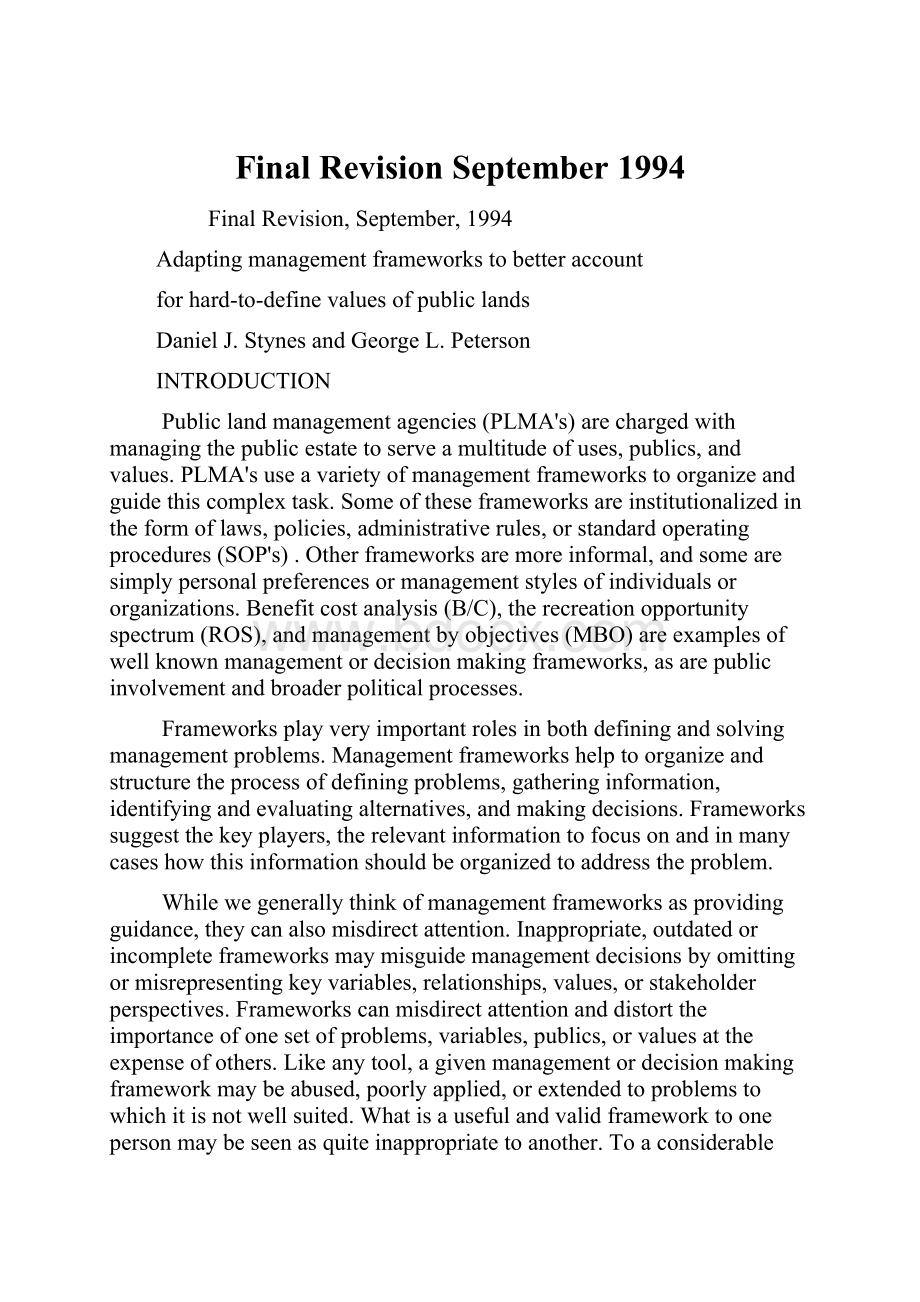Final Revision September 1994.docx
《Final Revision September 1994.docx》由会员分享,可在线阅读,更多相关《Final Revision September 1994.docx(19页珍藏版)》请在冰豆网上搜索。

FinalRevisionSeptember1994
FinalRevision,September,1994
Adaptingmanagementframeworkstobetteraccount
forhard-to-definevaluesofpubliclands
DanielJ.StynesandGeorgeL.Peterson
INTRODUCTION
Publiclandmanagementagencies(PLMA's)arechargedwithmanagingthepublicestatetoserveamultitudeofuses,publics,andvalues.PLMA'suseavarietyofmanagementframeworkstoorganizeandguidethiscomplextask.Someoftheseframeworksareinstitutionalizedintheformoflaws,policies,administrativerules,orstandardoperatingprocedures(SOP's).Otherframeworksaremoreinformal,andsomearesimplypersonalpreferencesormanagementstylesofindividualsororganizations.Benefitcostanalysis(B/C),therecreationopportunityspectrum(ROS),andmanagementbyobjectives(MBO)areexamplesofwellknownmanagementordecisionmakingframeworks,asarepublicinvolvementandbroaderpoliticalprocesses.
Frameworksplayveryimportantrolesinbothdefiningandsolvingmanagementproblems.Managementframeworkshelptoorganizeandstructuretheprocessofdefiningproblems,gatheringinformation,identifyingandevaluatingalternatives,andmakingdecisions.Frameworkssuggestthekeyplayers,therelevantinformationtofocusonandinmanycaseshowthisinformationshouldbeorganizedtoaddresstheproblem.
Whilewegenerallythinkofmanagementframeworksasprovidingguidance,theycanalsomisdirectattention.Inappropriate,outdatedorincompleteframeworksmaymisguidemanagementdecisionsbyomittingormisrepresentingkeyvariables,relationships,values,orstakeholderperspectives.Frameworkscanmisdirectattentionanddistorttheimportanceofonesetofproblems,variables,publics,orvaluesattheexpenseofothers.Likeanytool,agivenmanagementordecisionmakingframeworkmaybeabused,poorlyapplied,orextendedtoproblemstowhichitisnotwellsuited.Whatisausefulandvalidframeworktoonepersonmaybeseenasquiteinappropriatetoanother.Toaconsiderableextentourperspectiveonaparticularproblemandmanyofourvaluesareembeddedintheframeworkswechoose.
Theabilityorinabilityofexistingmanagementframeworkstohandlecertain"hardtodefine"valuesisourconcernhere.Frameworksfrequentlydirectourattentiontocertainvaluesandparticularrepresentationsofthesevalues.InhighlystructuredanalyticalframeworkslikeB/Canalysis,valuesaremadeexplicit,sothatitisclearwhichvalueshavebeenconsideredornotconsidered,howeachvaluehasbeenrepresented,andwhatroleorweighteachreceivesinagivenmanagementdecision.Inothertypesofframeworks,likepublicinvolvementprocessesandadvisorygroups,valuesareimplicitlyrepresentedbyvariousparticipants.Bydefinition,"hardtodefine"valuesaregenerallyimplicit,leavingconsiderableroomforinterpretationofwhether,how,orhowwellsuchvalueshavebeentakenintoaccountinagivendecision.
Weinitiallyapproachedthischapterthinkingoffairlyspecificmanagementanddecisionmakingframeworkslikebenefitcostanalysis,publicinvolvementprocedures,theROSsystemandthelike.Theseframeworkseachprovideanexplicitorimplicitwayofincorporatingcertainvaluesinpubliclandmanagementdecisions.Ourtaskwastoextendtheseframeworkstobetteraccountfor"hardtodefinevalues"andmulticulturalperspectives.Aswelistenedtotheotherparticipantsattheworkshopsorganizedtoplanthisbook,itdawnedonusthatmostoftheframeworkswewereconsideringwerealreadypartofaparticularculturalperspective,i.e.thepubliclandmanagementandsupportingresearchprofessions.Objectionsvoicedby"outsiders"wereoftenasmuchwiththeframeworksthemselvesaswiththehandlingofparticularvalueswithintheseframeworks.
Frameworksarenotvalueneutral.Frameworksimplictlyembraceasetofcurrentlyheldvalues.Indeed,oneimportantroleofframeworksistoemphasizeandfosteraparticularsetofvalues.Embeddedwithinbenefitcostanalysisarevaluesofefficiency,consumersovereignty,themarketsystem,andformalanalyticalprocesses.Publicinvolvementframeworksembodythevaluesofademocraticsystem,informedcitizenryandpoliticalprocess.ROS,LACandothercarryingcapacity-relatedframeworksembracevaluesofsustainabilityandconservation.Theseembeddedvaluesareoftenwidelyshared,atleastwithintheorganizationsandindividualsembracingaparticularframework,sothattheyarerarelyquestionedfromwithin.Acrossculturesanddisciplines,however,thereisconsiderablediversityanddisagreementoverframeworks.Battlesbetweenenvironmentalistsanddevelopers,economistsandsociologists,RepublicansandDemocrats,andMarxistsandCapitalistsareasmuchoverframeworks,asoveranyparticularvalues.Whentwogroupsarehavingdifficultycommunicating,theyoftenhavenotagreedonacommonlanguageorperspective.
PUBLICLANDMANAGEMENTAGENCYPARADIGMS
Theterm"paradigm"wasintroducedbyKuhn(1962)todescribehowresearchisguidedanddirectedbyanagreeduponsetofconcepts,theories,andmethods.BrownandHarris(1992)notehowtheideaextendsreadilytoparticularculturalworldviews(Pirages1977,DunlapandvanLiere,1984)andtopubliclandmanagementorganizations(Behan1990).TheparadigmunderwhichaparticularPLMAoperatesisdefinedbythelegislation,missionstatements,organizationalstructures,managementframeworks,valuesandindividualsthatguidetheagency.Managementframeworksandvaluesbothdefineandandaredefinedbytheorganization'sdominantparadigm.ImportantelementsofthedominantPLMAparadigmsintheUnitedStatesarestewardship,professionalism,scientificmanagement,alandethic,efficiency,andpublicparticipationindecisions.Spiritualandother"hardtodefine"valuesthatdonotreceiveextensiveattentionwithinPLMA'stendtofalloutsideof,orinsomecasesconflictwithoneormoreelementsofthedominantparadigm.
Twoalternativewaystoincreaseconsiderationofthesehardtodefinevaluesistolinkthevaluesmoreclearlytoexistingparadigmsortoadoptnewlandmanagementparadigmsthatbetterreflectandsupportthesevalues.Thesetwoapproachesareveryapparentinthechaptersofthisbookwithsomeauthorssuggestingmarginaladjustmentsinexistingapproaches,whileothersargueforentirelynewparadigms.AsBrownandHarris(1992)pointout,competingparadigmsexistwithinPLMA'sliketheU.S.ForestServiceandtovaryingdegreesthesecompetingparadigmsseektochangeoroverthrowtheacceptedorofficialones.
Thevaluesandparadigmsembodiedbypubliclandmanagementorganizationsare,however,onlypartofthepicture.PLMA'saremadeupofindividualswhoalongwiththeorganizationitself,functionwithinaparticularcultural,social,andpoliticalcontext.Individualmanagersbringtheirownvalues,worldviews,decisionmakingstylesandculturalbackgroundstotheirjobs.Decisionsandapproachestakenbyanygivenindividualintheorganizationwillreflectbothorganizationalandpersonalvalues.Collectivedecisionsaremorelikelytoreflectthecommonorganizationalparadigm,althoughthesetoowillbeinfluencedbythemixofindividualsthatareinvolved.Oneoftheargumentsforworkforcediversityistocaptureabroaderrangeofperspectives,stylesandvalueswithintheorganization.
PUBLICS:
ANOTHERSETOFPARADIGMSANDVALUES
Thepublicin"publiclandmanagement"dictatesthatthevaluesofawiderangeofindividuals,organizations,andstakeholdergroupsbeconsideredinlandmanagementdecisions.PartofthechangingmanagementparadigmofPLMA'soverthepasttwentyyearshasbeentheaddedimportanceofpublicinvolvement.Thisparadigmshiftinvolveschangesinproceduresandframeworks,aswellasachangeinphilosophy(Sample1993).Whilepublicinvolvementservesavarietyofpurposesfrominformationaltocooption(Heberlein1976)therolethatdirectlyconcernsushereistheuseofpublicinvolvementasavehicleforinjectingadditionalvalueinformationintopubliclandmanagementdecisions.PublicparticipationproceduresareoneoftheprimaryvehiclesPLMA'susetodealwithhardtodefinevalues,as"easiertodefine"valuescanoftenbecapturedwithinexistinganalyticalframeworks.
Partofthecomplexityofpubliclandmanagementisthenumberanddiversityofpublicswithinterestsinhowpubliclandsaremanaged.Publicshavetraditionallybeendefinedtoincluderelatedfederal,stateandlocalagencies,specialcommodityandenvironmentalinterestgroups,andindividualstakeholders.Thesepublicsholdsomewhatdistinctvaluesrelativetomanagementissues,butperhapsmoreimportantlytheyapproachtheissuesfromquitedistinctperspectives.Eachperspectivesuggestsasomewhatdifferentmanagementordecisonmakingframework,whichinturndictateswhatvaluesarerelevantandhowtheyarerepresented.Objectionsarefrequentlyraisedwhenvaluesarisingfromoneworldvieworperspectiveareforcedintoaframeworkthatisseenasincompatible.
CulturaldiversitypresentsarelativelynewsetofissuesforPLMA's.Minoritygroupshavenothistoricallybeenwellrepresentedwithinpubliclandmanagementprofessions/agencies(Mohai,Stillmanet.al.1994)orinpublicparticipationforums(Burch1976,ForceandWilliams1989).ManaginglandstoaccountforculturaldiversitythereforeposesnewchallengesforPLMA's(McDonough1991).Differencesinvaluesandculturalparadigmsorworldviewsarefurtherconfoundedbydifferencesinlanguagesandincommunicationandnegotiationstyles.HowcanPLMA'sbettercommunicatevalueinformationacrossculturesinordertounderstandandreconcilevaluesthatarerepresente